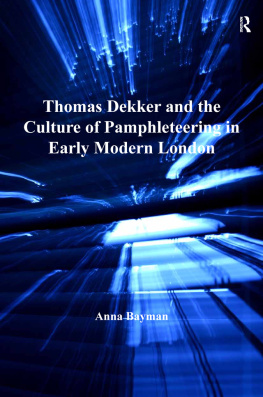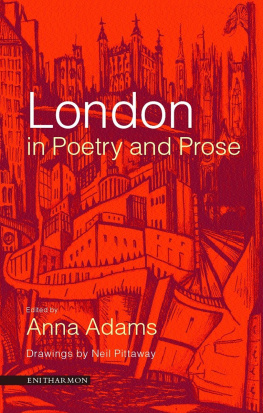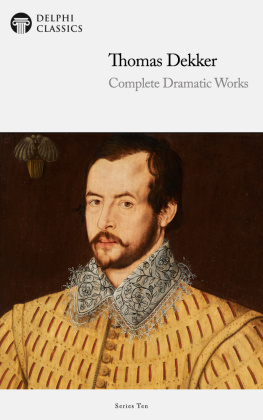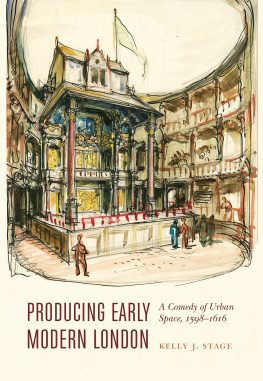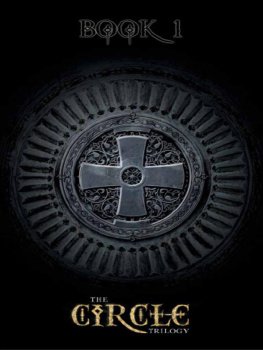THOMAS DEKKER AND THE CULTURE OF PAMPHLETEERING IN EARLY MODERN LONDON
Thomas Dekker and the
Culture of Pamphleteering in
Early Modern London
ANNA BAYMAN
First published 2014 by Ashgate Publishing
Published 2016 by Routledge
2 Park Square, Milton Park, Abingdon, Oxon OX14 4RN
711 Third Avenue, New York, NY 10017, USA
Routledge is an imprint of the Taylor & Francis Group, an informa business
Copyright 2014 Anna Bayman
All rights reserved. No part of this book may be reprinted or reproduced or utilised in any form or by any electronic, mechanical, or other means, now known or hereafter invented, including photocopying and recording, or in any information storage or retrieval system, without permission in writing from the publishers.
Anna Bayman has asserted her right under the Copyright, Designs and Patents Act, 1988, to be identified as the author of this work.
Notice:
Product or corporate names may be trademarks or registered trademarks, and are used only for identification and explanation without intent to infringe.
British Library Cataloguing in Publication Data
A catalogue record for this book is available from the British Library.
The Library of Congress has cataloged the printed edition as follows:
Bayman, Anna, 1976-
Thomas Dekker and the Culture of Pamphleteering in Early Modern London / by Anna Bayman.
pages cm
Includes index.
ISBN 978-0-7546-6173-3 (hardcover) -- ISBN 978-1-3155-5106-7 (ebook) -- ISBN 978-1-3170-1050-0 (epub) 1. Dekker, Thomas, approximately 1572-1632--Criticism and interpretation. 2. English prose literature--Early modern, 1500-1700--History and criticism. 3. Pamphleteers--Great Britain--History--17th century. Title.
PR2494.B39 2014
822'.3--dc23
2013031548
ISBN 9780754661733 (hbk)
ISBN 9781315551067 (ebk)
Contents
Acknowledgements
This book has taken me much too long to write, and the list of people whom I should thank has become correspondingly, and absurdly, long. I could not write it out in full. Colleagues in Oxford (especially at St Hildas and at Balliol), Reading and London, and at EHR and P&P all helped me immensely. Parts of this book originated in my thesis, and I am very grateful to my examiners for their advice and support, as well as to the AHRC for funding my doctoral research, and to the Past & Present Society for post-doctoral support. Much later in the process, my editors at Ashgate were models of patience and helpfulness, and Ashgates anonymous reader was both very kind and very constructive. When I was writing my doctoral thesis on the Jacobean pamphleteers, my supervisor, Felicity Heal, asked on more than one occasion if I really wanted to focus on Dekker; this book is an admission that she was, of course, right. Like Felicity, Ian Archer, Pauline Croft, Leif Dixon, Clive Holmes, Matt Jenkinson, Lyndal Roper, Grant Tapsell, Jenny Wormald, and Catherine Wright were friends as well as inspiring historians. To George Southcombe and Alex Gajda, because I dont know how to thank them sufficiently, I would like to say: Im so grateful to you for making it all that much fun, for making sense of my muddled ideas, and for constantly astonishing me with your brilliance.
My family have been more helpful and supportive than anyone could really deserve. Thank you to my parents and sister, and most of all to Michael (who among everything else did so much to help me write). The exceptions were Holly and Raphael, who made it a great deal harder to finish this book, and I love them dearly for it. Its for them, and for Michael, with love.
A note about the text: spelling in quotations follows the original, but I have silently modernised j to i, u to v, vv to w, etc. Place of publication for printed works is London unless otherwise indicated. Authors names have been silently expanded and given in modern spelling; where there is doubt over authorship names are given in square brackets.
Introduction
This Printing age of ours
This book is about what it meant to write and to read pamphlets in early seventeenth-century London. It is also about what those pamphlets can tell us about the ideas and mentalities of their readers and writers, about the worlds they inhabited and the ways in which the culture of the printed word interacted with their lives and environment. It looks at those big topics through a small lens, the printed prose works of the writer Thomas Dekker, refracting them through Dekkers extended consideration of what I have termed the culture of pamphleteering, and Dekker called this Printing age; and it argues that the distinctive qualities of pamphleteering permitted it to act in peculiarly effective ways on its environment and readers. The question that lies at the heart of this introduction, what was pamphleteering, really lies underneath the whole book; and it is in seeking to define the culture of pamphleteering that the book engages with the wider issues of early seventeenth-century civic life, religion and politics. But it will start with Dekker, for it is Dekkers particular understanding of what pamphleteering was that underpins all that follows.
Dekker, a prolific professional writer, is best known as a second-rate playwright of the age of Shakespeare. We can be sure of only a few biographical details. His writing career ran from the 1590s until the 1630s. A comment in the 1632 edition of one of his most famous pamphlets, Lanthorne and Candle-Light, that he had reached three-score years suggests a date of birth around 1572, and it is implied in another pamphlet (The Seven Deadly Sinnes of London) that he was born and grew up in London. He spent time in prison for debt, in 1598, 1599, and between 1613 and 1620. We know of Dekkers first wife, Mary, from her burial record (she died in 1616, while Dekker was in prison, and was buried in St James, Clerkenwell); and the baptisms of three daughters, Dorcas, Elizabeth, and Anne, are recorded in St Giles, Cripplegate. A Thomas Deckers, gentleman of St James, Clerkenwell was entered twice for failing to attend church, in 1626 and 1628. A Thomas Decker, householder was buried at St James, Clerkenwell, in August 1632, who seems identifiable with Dekker not least since there was no
Dekkers first known work was his contribution, in the pay of Philip Henslowe, to the play Sir Thomas More, whose principal author was Anthony Munday (Dekker was certainly involved in its revision, and may also have had a hand in its original composition in around 15934). After this, he was involved in writing and revising around 50 plays before the closure of the theatres during the 1603 plague, most of which were for Henslowe and very few of which were solo efforts. His widows renunciation of his estate also suggests that he died in debt.
Much critical assessment of Dekkers work has been dominated by the sense that his writing was driven by his need to earn a living: a condescending attitude to Dekker has been identified by his DNB biographer as well as other more recent critics, who find that the tendency to categorise Dekker as a hack writer, inferior in ability to his more famous contemporaries, willing to spread himself thin and to turn his pen to anything for which someone might pay him, and as gentle and tolerant (not least because disinclined to write anything that might offend), can be traced from his contemporaries onwards. Revisions of this approach to Dekker include that of John Twyning, who finds acute and

